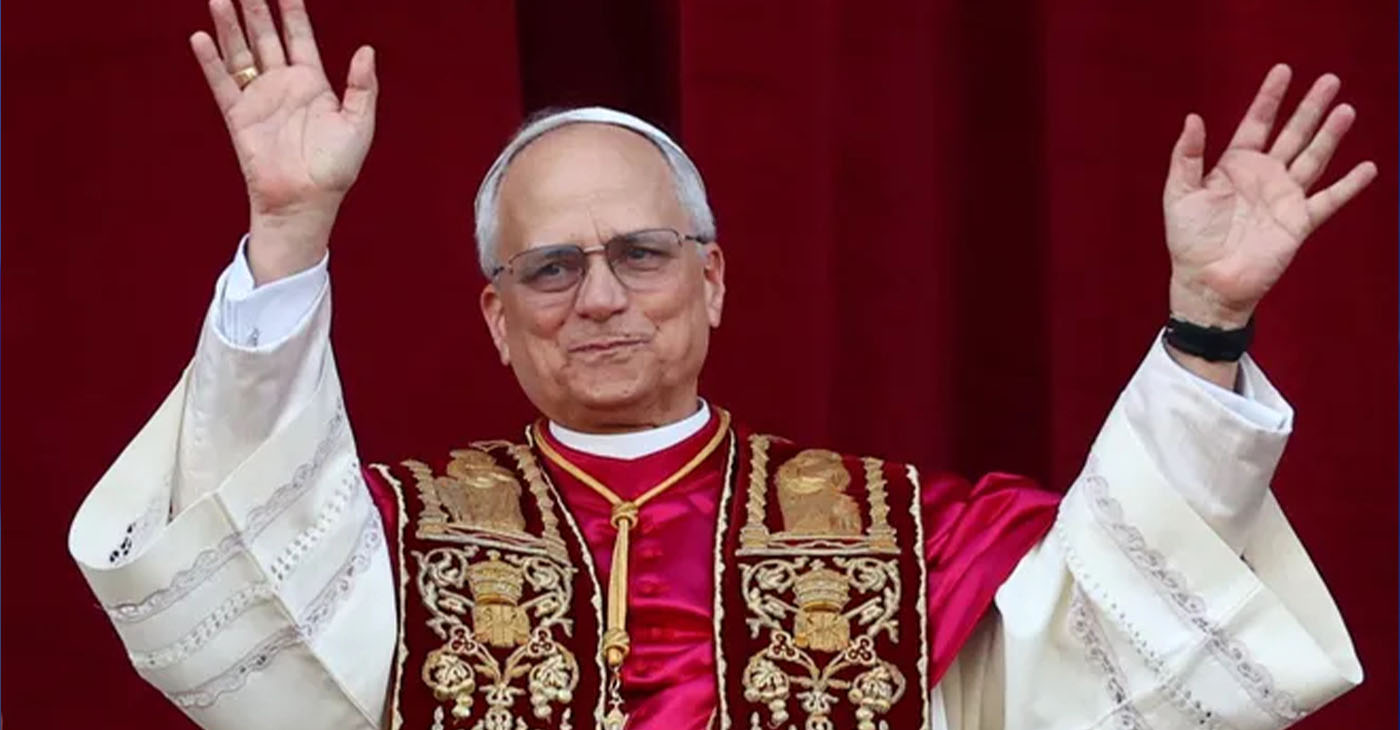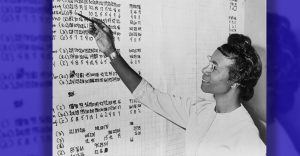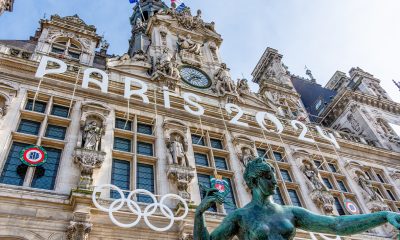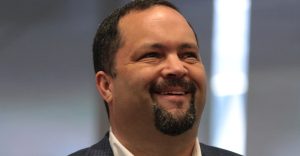World
In Trinidad, Former FIFA Executive Seen as ‘Our Robin Hood’

Former FIFA vice president Jack Warner hold a copy of a check while he speaks at a political rally in Marabella, Trinidad and Tobago, Wednesday, June 3, 2015. Warner made a televised address Wednesday night, saying he will prove a link between soccer’s governing body and his nation’s elections in 2010. Warner said he has documents and checks that link FIFA officials, including embattled President Sepp Blatter, to the 2010 election in Trinidad and Tobago. (AP Photo/Anthony Harris)
TIM REYNOLDS, AP Sports Writer
PORT-OF-SPAIN, Trinidad (AP) — In one moment, Jack Warner is on TV telling his countrymen he fears for his life. An hour later, he’s standing on a packed narrow street at a political rally, boasting that he fears nothing.
Contradictions are a constant for Warner, who grew up with almost nothing in Trinidad and Tobago, and became a rich and powerful vice president of FIFA, world soccer’s governing body. He rubbed elbows with world leaders on a regular basis before being forced out in an ethics scandal four years ago.
Now, his empire seems on the verge of crumbling.
Indicted last week by the U.S. on charges of racketeering, wire fraud and money-laundering, Warner scoffs at the accusations, insisting he’s done nothing wrong.
In Trinidad, they’ve heard it all before, though many residents say if Warner amassed riches without taking it from them, they’re fine with the arrangement.
“He is our Robin Hood,” said Eraj Sagewan, a taxi driver in the capital of Port-of- Spain.
That’s how many in Trinidad see the 72-year-old Warner, now a member of Parliament. If he stole from the rich and gave to the poor, then they see no harm done. He is simultaneously a villain and a hero, known for getting what he wants, but also for personally arranging whatever help — doctors, food, anything — his constituents need.
“If he didn’t live so long, he would have died a hero,” said Sunity Maharaj, a journalist who has long followed Warner. “He would have been the story of the little boy who grew up to be FIFA vice president.”
Warner doesn’t hide his hubris and says the world’s perception of him is nowhere near the reality.
“Everybody knows Jack Warner is bad news. Jack Warner has Ebola,” he says to an ovation — bolstered by piped-in cheers from an elaborate sound system.
The rally starts late, with about 50 people. The neighborhood’s barking dogs are louder than the crowd. Locals set up tables to sell crackers and snow cones.
After an hour or so, Warner arrives, wearing the lime green colors of his Independent Liberal Party. The street is jammed, with the crowd having grown fivefold and police help with traffic and crowd control. The dogs can’t be heard anymore.
“I do this for you!” Warner proclaims.
Said Ria Bisnath, an observer: “If this was America, you would call Jack Warner a rock star.”
His future is uncertain, something Warner acknowledges. The charges that revolve around allegations of bribery are the most serious he has faced, although he insists they are trumped up.
Warner maintains the Americans are still upset that FIFA — which he left in disgrace in 2011 after being implicated in an earlier bribery scandal — awarded the 2022 World Cup to Qatar and not the U.S.
“Nobody, no contractor, alive or dead, can say he gave me a kickback,” Warner said. “Everything I have now, I had before politics. But there are some guys in politics now who had nothing before. How come nobody is concerned with that? … But they’re concerned about FIFA’s money because they feel that that will make Jack Warner fall.”
U.S. prosecutors allege South Africa paid $10 million in 2008 to Warner and two other FIFA executive committee members as payback for supporting that nation’s successful bid to host the 2010 World Cup over Morocco. South African officials say the $10 million was paid, though it does not characterize it as a bribe, calling it an “above-board payment” to help soccer development in the Caribbean region.
Officials also allege he and others, including former FIFA executive committee member Chuck Blazer of the U.S., got rich off accounts they controlled through CONCACAF, which oversees soccer in North and Central America and the Caribbean. Blazer has cooperated with authorities. Some of that money is believed to have been steered toward a building in Trinidad called the Center of Excellence. Warner has denied owning the center — where residents go to play soccer, swim, even have wedding receptions — but records show otherwise.
Warner said Wednesday night he has compiled reams of documents to expose wrongdoing, adding that when he heard FIFA President Sepp Blatter was planning to resign, he wrote him and urged his immediate departure.
“Blatter knows why he fell. And if anyone else knows, I do,” Warner said.
Warner’s supporters say the charges are meant to embarrass him ahead of elections this year, with Liberal Independent Party chairman Rekha Ramjit calling them “political manipulation to the highest extent.”
Simply saying the name “Jack” to hotel workers, waiters, lawmakers and others elicits a reaction, often accompanied by an eye roll. Some, including top soccer officials, refused to talk about him.
“I take no pleasure in Mr. Warner’s sufferings and his family’s pain,” said opposition party leader Keith Rowley. “I trust that he will be the subject of free and fair judicial processes in Trinidad and Tobago and outside. Let the law take its course.”
Warner often speaks out against the press — he made specific reference to the media at his political rally Wednesday night and later said U.S. reporters were unfair to him — yet he publishes a weekly newspaper and has thrown lavish parties for even those journalists who have criticized him. He writes commentaries, but doesn’t like answering questions. He was mocked on the Internet earlier in the week after he tried to defend himself by quoting an article from the satirical outlet The Onion.
Spending a night in jail after his arrest last week was a good thing, he said, because he got to tell other Trinidadian leaders they should clean up the prisons.
Maybe there’s no better example of the many sides of Warner than what happened at a World Cup qualifying match in Port-of-Spain in 1989. The U.S. beat Trinidad and Tobago 1-0 that day inside a packed stadium, winning on a goal from Paul Caligiuri — still regarded as one of the most important goals in American soccer history.
Two perceptions of Warner have persevered: Is he the ambassador who humbly gave Caligiuri his straw hat as a token of congratulations in the U.S. locker room after the game? Or is he the promoter who arranged for the overselling of thousands of tickets, leaving some without a view or stuck outside the stadium?
“Sometimes I deliberately break my rear-view mirror, because it is not always pleasant to look back,” said Raymond Tim Kee, the mayor of Port-of-Spain who also leads the soccer association that Warner once controlled financially. “Since I assumed office two years ago, one of the first things I pursued was rebranding because what I realized was the football federation at the time had lost credibility and there were a lot of questions and fears because of all that was going on that time.”
Tim Kee formed an independent reform commission and is keeping a keen eye on the latest Warner scandal.
“I have the utmost confidence in the U.S. ability to dig deep. … So I have trust in the authorities and their ability to uncover things,” he said.
To this day, what is best remembered about soccer in Trinidad is the run to the 2006 World Cup, the first and only time the tiny nation has reached the sport’s biggest stage. What should have been a gigantic celebration is known here for Warner feuding with players over compensation.
That’s where Warner’s gift of deflection comes into play. When asked what happened at the time, Warner responded with a story about how he mortgaged his home to fund Trinidad’s attempt to qualify for the 1994 World Cup.
“Gandhi once said that all through history, there have been tyrants,” Warner said. “But in the end, they fall.”
Copyright 2015 The Associated Press. All rights reserved. This material may not be published, broadcast, rewritten or redistributed.
Activism
African Union Group to Award Rev. Dr. Amos Brown for Bringing Civil Rights Movement to Global Stage
Dr. Macaulay Kalu, secretary general of AU6RG, will present Dr. Brown with the Global Peace Builder Award. Other presenters include Rev. Dr. Freddie Haynes, senior pastor of Friendship West Baptist Church in Dallas; Oakland Mayor Barbara Lee, long-time advocate for appropriations to Africa as a congressmember; Rick Callendar, California-Hawaii president of the NAACP; Dr. Ike Neliaku, president and chairman of the Nigerian Institute of Public Relations; Pastor Ituah Ighodalo, head of the African Leadership Group and Ambassador Thompson and John William Templeton, founder of the Journal of Black Innovation National Black Business Month®.

By Carla Thomas and John William Templeton
On Aug. 31, the Third Baptist Church of San Francisco will mark its 173rd anniversary with an event steeped in history and global significance. This year’s commemoration, themed “Achieving Dr. King’s Promised Land Together,” will honor the lifelong achievements of Dr. Amos C. Brown, Sr.— a towering figure in the Civil Rights Movement — on a day that also observes the International Day for People of African Descent.
Brown will be recognized by the African Union’s organ for Africans abroad for ‘planetizing’ the civil rights movement gains at San Francisco’s Third Baptist Church, 1399 McAllister St., at 3 p.m.
The African Union, made up of 54 countries on the African continent, consists of five regions. It created a sixth region, the African Union Sixth Region Global (AU6RG), for the 400 million Africans living abroad. On Sept. 7, the second AU-Caribbean Community Summit occurs in Addis Ababa, Ethiopia.
Dr. Macaulay Kalu, secretary general of AU6RG, will present Dr. Brown with the Global Peace Builder Award. Other presenters include Rev. Dr. Freddie Haynes, senior pastor of Friendship West Baptist Church in Dallas; Oakland Mayor Barbara Lee, long-time advocate for appropriations to Africa as a congressmember; Rick Callendar, California-Hawaii president of the NAACP; Dr. Ike Neliaku, president and chairman of the Nigerian Institute of Public Relations; Pastor Ituah Ighodalo, head of the African Leadership Group and Ambassador Thompson and John William Templeton, founder of the Journal of Black Innovation National Black Business Month®.
Held during the 173rd anniversary of the church, the event called “Africa-America: Achieving Dr. King’s Promised Land Together” is a Diaspora-wide discussion led by Dr. Brown on what Martin Luther King, Jr. would say today.
Galvanized by the horrific 1955 slaying of Emmett Till, Dr. Brown’s journey in activism began in Jackson, Mississippi, where a neighbor, Medgar Evers, the NAACP’s first field secretary in that state, encouraged Brown to found the Mississippi NAACP Youth Council.
In 1956, Evers personally drove Brown to the NAACP convention in San Francisco, where Brown would first hear Dr. Martin Luther King Jr. speak. Brown became a prominent Freedom Rider, later attending Morehouse College and taking the only class Dr. King ever taught there. Thirteen years after Evers was assassinated in Jackson, Brown arrived at Third Baptist Church in 1976, serving with distinction for 49 years before his recent retirement. Under his stewardship, the church solidified its commitment to social justice and international unity.
His Excellency Rev. Ladi Peter Thompson, deputy secretary general for peace and security of AU6RG, said, “As a mentee of Medgar Evers, Freedom Rider and student of Dr. Martin Luther King Jr., Dr. Brown is the perfect authority for the young people of the Diaspora on achieving the prophetic goal that Dr. King foresaw in Memphis.”
Lady Dentaa Amoateng, founder of Grow, Unite, Build Africa (GUBA), will also announce that Dr. Brown is an honoree at the GUBA Award in Bridgetown, Barbados in November. The popular actress in Ghana and the United Kingdom will attend in person.
Dr. Lezli Baskerville, president/counsel of the National Association for Equal Opportunity in Higher Education, which includes 105 Historically Black Colleges and Universities (HBCUs) and 90 predominantly Black institutions (PBIs), invites its students, faculty, and alumni to attend or join remotely.
“HBCUs produced both Dr. King and Dr. Kwame Nkrumah and are the fountainhead for Diaspora unity,” said Baskerville.
Templeton, author of “ReUNION: State of Black Business, 22d edition,” said “Our movement will advocate the continuance of tariff-free treatment for Africa and the Caribbean; respect for African-American and African elected officials and the 13th, 14th, and 15th Amendments and the strengthening of educational and research connections across the Diaspora.”
Templeton said Black institutions have been at the forefront of defining the image of 1.5 billion Black people globally, a mission that is even more important as African youth will be the majority of the world’s young people in the coming decades.
ABOUT THIRD BAPTIST CHURCH
Founded on West Indian Emancipation Day on Aug.1, 1852, Third Baptist said in its annual report in 1858 that its sole purpose was the elimination of American chattel slavery and took an active role among the California abolitionists who convinced President Abraham Lincoln to issue the Emancipation Proclamation. The current sanctuary is constructed with wood from the Goodall Mansion, where President U.S. Grant stayed after leaving the White House, and is the last place where Dr. W.E.B. DuBois spoke before leaving for Africa in 1958.
Activism
Newsom, Pelosi Welcome Election of First American Pope; Call for Unity and Compassion
“In his first address, he reminded us that God loves each and every person,” said Newsom. “We trust that he will shepherd us through the best of the Church’s teachings: to respect human dignity, care for the poor, and wish for the common good of us all.” Newsom also expressed hope that the pontiff’s leadership would serve as a unifying force in a time of global instability.

By Bo Tefu, California Black Media
Gov. Gavin Newsom and First Partner Jennifer Siebel Newsom on May 8 issued a statement congratulating Pope Leo XIV on his historic election as the first American to lead the Catholic Church.
The announcement has drawn widespread reaction from U.S. leaders, including former House Speaker Nancy Pelosi, who called the moment spiritually significant and aligned with the values of service and social justice.
In their statement, the Newsoms expressed hope that the newly elected pope would guide the Church with a focus on compassion, dignity, and care for the most vulnerable. Newsom said he and the First Partner joined others around the world in celebrating the milestone and were encouraged by the pope’s first message.
“In his first address, he reminded us that God loves each and every person,” said Newsom. “We trust that he will shepherd us through the best of the Church’s teachings: to respect human dignity, care for the poor, and wish for the common good of us all.”
Newsom also expressed hope that the pontiff’s leadership would serve as a unifying force in a time of global instability.
“May he remind us that our better angels are not far away — they’re always within us, waiting to be heard,” he said.
Pelosi, a devout Catholic, also welcomed the pope’s election and noted his symbolic connection to earlier church leaders who championed workers’ rights and social equality.
“It is heartening that His Holiness continued the blessing that Pope Francis gave on Easter Sunday: ‘God loves everyone. Evil will not prevail,’” said Pelosi.
Activism
Retired Bay Area Journalist Finds Success in Paris with Black History Tours
In the late 90s, Stevenson finally realized her dream of living in Paris, now with her daughter. She started exploring the history of Africans in the city and would go on to teach others the same. Her business, which she named Black Paris Tours (BPT), received a significant boost when a family friend gave her a stack of cash and encouraged her to expand on the knowledge that she had only started to share with people she knew.

By Post Staff
There were two things Oakland-born, East Palo Alto-raised Ricki Stevenson always dreamed of:
- Going to New York as a newscaster to tell the true story of Blacks in America.
- Living and working in Paris one day.
Her dreams of life in Paris began when she was three years old and her mother, a former professional dancer, took her to see Josephine Baker perform. She was 11 when her parents took her to the Stanford University campus to meet James Baldwin, who was speaking about his book, “The Fire Next Time.” Ricki says that’s when she knew she’d one day live in Paris, “the city of light!”
But before that would ever happen, she had a tumultuous career as a newscaster across the country that was inspired by her family’s history.
Stevenson recalls marching with Cesar Chavez as he fought for labor rights for farm workers in California.
“Are we Mexican too?” she asked her parents. “No, but we will fight for everyone’s human rights,” they responded to her.
Ironically, Ricki’s paternal family roots went back to Greenwood, Oklahoma, infamous for the 1921 bombing of Black Wall Street. A time when Black people had oil wells, banks, and a thriving business community.
This background would propel her into a 25-year journalism career that gave her the opportunity to interview greats like President Jimmy Carter, PLO leader Yassir Arafat, James Baldwin, Rev. Jesse Jackson, UN Ambassador Andrew Young, Miriam Makeba, and the leaders of South African liberation movements.
A job offer from KCBS radio brought her back to the Bay Area in the 1980s. Then came the switch to TV when she was hired as a Silicon Valley business reporter with KSTS TV, working at the first Black-owned television station in northern CA (created and owned by John Douglas). Along the way, Stevenson worked as an entertainment reporter with BET; coproduced, with her disc jockey brother Isaac, a Bay Area show called “Magic Number Video;” lived in Saudi Arabia; worked as an international travel reporter with News Travel Network; and worked at KRON TV a news anchor and talk show host.
In 1997, Stevenson realized her dream of living in Paris with her young daughter, Dedie. She started exploring the history of Africans in the city and would go on to teach others the same. Her business, which she named Black Paris Tours (BPT), received a significant boost when a family friend, Admiral Robert Toney put a chunk of money in her hand. He said, “Ricki, my wife and I have been coming to Paris for 20 years, but in just two days with you and Dedie, we’ve learned and seen more than we ever did before.”
Years after BPT took off, Ricki met Nawo Carol Crawford and Miguel Overton Guerra, who she recruited as senior scholar guides for Black Paris Tours.
Guerra says he is proud of his work with Black Paris Tours in that it provides a wealth of information about the rich legacy of African and African American history and influence in Paris and Europe.
“I tend to have a feeling for history always being a means of a reference point backwards … you start to understand the history, that it isn’t just the United States, that it began with African people,” Guerra says.
He said that it’s been a pleasure to watch people learn something they didn’t know before and to take them through the city to key points in Black history, like hangout spots for writers like Baldwin and Richard Wright, restaurants in the busiest parts of Paris, the home of Josephine Baker and so much more.
Although the tours are open to all, Guerra hopes that those of African descent from all over the world can embrace that they don’t have to just stay where they are because movies and media have portrayed cities like Paris to be only white, it’s multicultural and accepting to all.
“We’ve been here, and we’ve been there, going way back when. And we shouldn’t be considered or consider ourselves to be strangers in any place that we go to,” he said.
Stevenson notes they’ve had 150,000 people take their tour over the years, with notables like former NFL quarterback Colin Kaepernick, Smokey Robinson, Steve Harvey, Miriam Makeba, and more.
Friends and former media colleagues of Stevenson compliment the BPT crew on their knowledge of the city and their ability to always keep it interesting.
“He [Guerra] just had a deep, deep wealth of knowledge and he was constantly supplanting information with historical facts and the like. I love that it was demonstrating and showing how Black people have thrived in Paris or contributed to the culture in Paris,” Candice Francis said.
She toured in the summer of 2022 and stated that in the two weeks that they visited Paris, BPT was the highlight of her trip. She shared that she was proud of Stevenson and the life she’d managed to manifest and build for herself.
“Even if you’re visiting Paris for the tenth time, if you haven’t taken the tour, then by all means, take it,” Francis emphasized.
Magaly Muñoz, Gay Plair and Paul Cobb also contributed to this story. You can book your own adventure with Black Paris Tours at www.blackparistour.com.
-

 Activism4 weeks ago
Activism4 weeks agoOakland Post: Week of November 12 – 18, 2025
-

 Activism3 weeks ago
Activism3 weeks agoIN MEMORIAM: William ‘Bill’ Patterson, 94
-

 Activism4 weeks ago
Activism4 weeks agoHow Charles R. Drew University Navigated More Than $20 Million in Fed Cuts – Still Prioritizing Students and Community Health
-

 Bay Area4 weeks ago
Bay Area4 weeks agoNo Justice in the Justice System
-

 #NNPA BlackPress3 weeks ago
#NNPA BlackPress3 weeks agoLewis Hamilton set to start LAST in Saturday Night’s Las Vegas Grand Prix
-

 #NNPA BlackPress2 weeks ago
#NNPA BlackPress2 weeks agoBeyoncé and Jay-Z make rare public appearance with Lewis Hamilton at Las Vegas Grand Prix
-

 Activism2 weeks ago
Activism2 weeks agoOakland Post: Week of November 19 – 25, 2025
-

 #NNPA BlackPress4 weeks ago
#NNPA BlackPress4 weeks agoThe Perfumed Hand of Hypocrisy: Trump Hosted Former Terror Suspect While America Condemns a Muslim Mayor

















































